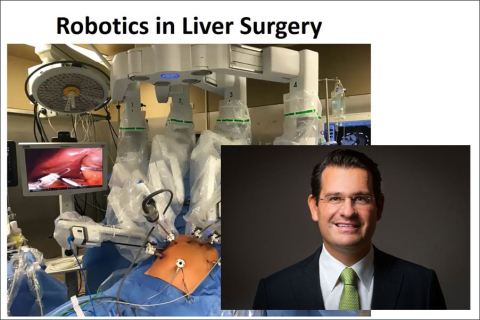The lecture was organized by the MUW Doctoral School within the framework of the STER Internationalization of NAWA Doctoral Schools program. The event was hosted by Prof. Michal Grąt, Director of the Doctoral School and Head of the Department of General, Transplant and Liver Surgery, at whose invitation Prof. Schmelzle gave the lecture at MUW.
Benefits of using minimally invasive techniques
Prof. Schmelzle stressed that for patients with hepatocellular carcinoma, resection should always be a considered treatment option. Especially in countries like Germany, where the number of organs for transplantation is a huge problem.
- In properly trained centers, liver resection should be performed by the use of laparoscopic technique, that is minimally invasive technique, especially for tumors in anterolateral and superficial locations, which is quite common in patients with HCC - Prof. Schmelzle explained.
Minimally invasive methods mean fewer complications, less pain after surgery, shorter hospital stay, while overall survival after this procedure compared to liver transplantation is not significantly different.
The impact of robotics in liver surgery
Robotics in liver surgery is still something new. The experts at the center headed by Prof. Schmelzle - Department of General, Visceral and Transplant Surgery Medical School Hannover, have been using this surgical treatment method since 2018. What does Prof. Schemlze think about its use?
- We are confident that the use of robotics brings better results compared to open surgery - the speaker said, although, as he stressed, using a robot makes sense in the most complicated cases.
- I would opt for robotic surgery in cases considered "expert," and for surgery using laparoscopic techniques in those less "expert."
However, Professor Schmelzle pointed out that robotic surgery is the future, and from his point of view, in 20 years it will be the main method used in liver surgery.
What else did the guest speaker talk about? Among other things, how changing habits and improving health before surgery reduces complication rates in patients treated with minimally invasive techniques, liver transplantation for recurrent disease, as well as machine perfusion, xenotransplantation and liver transplantation from a living donor.
Conclusions
Summarizing his lecture, Prof. Schmelzle stressed that the key to surgical treatment of liver cancer is a better understanding of tumor dynamics and biology. This will make it possible to distinguish between patients who may benefit from surgery and those who may not. It is equally important for surgeons to expand their knowledge of oncology and radiology as well as learn about new methods of treating tumors in order to choose the best option for patients. And given the problem with the number of organs for transplantation, Professor Schmelzle once again stressed that minimally invasive liver resection should be used in cases where it is possible.
